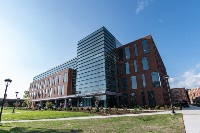
Biomedical Engineering is one of the newest engineering fields and at the cutting-edge of medical and engineering innovation. Biomedical engineers apply engineering principles and techniques to address challenges in health and medicine. It is a multidiscplinary field at the intersection of mechanical, electrical, and chemical engineering, and data science. Biomedical engineers research, design, develop, build, and test healthcare solutions.
The Biomedical Engineering B.S. degree program at Marian University provides a challenging yet rewarding experience for undergraduate students to develop as transformative engineering leaders and impactful global citizens, with an education rooted in Franciscan values. It prepares graduates for a variety of job opportunities upon graduation including biotechnology, clinical research, healthcare professions, and more.
 Our engineering programs are housed in the state-of-the-art Witchger Engineering Building. Here students have access to:
Our engineering programs are housed in the state-of-the-art Witchger Engineering Building. Here students have access to:
Most of our spaces are equipped with smart AV technology to facilitate multimodal learning.
The Biomedical Engineering B.S. degree curriculum provides a strong background in core engineering and science courses with an emphasis on:
The Biomedical Engineering program requires 129 semester credit hours for graduation. Topics cover 30 credits of general math/science, 24 credits of core engineering coursework, and an additional 45 hours of major specific requirements.
Note: a minor is required for graduation at Marian University.
General Math and Science Requirements (30 hours)
Engineering Core Requirements (24 hours)
Biomedical Engineering Requirements
(8 hours in Biology, 4 additional hours in Chemistry, and
36 hours in BME/EGR courses, totaling 48 hours)
Note: This plan is only a sample and will vary by student and course availability.
A minimum 2.0 cumulative GPA and a minimum 2.0 major GPA are required for graduation. To meet degree requirements, some disciplines require higher grades in each course or a higher cumulative GPA.
Course descriptions can be found on our online Course Catalog.
The Biomedical Engineering program is preparing to seek accreditation by the Engineering Accreditation Commission of ABET.
Graduates of the Biomedical Engineering Program will, within a few years of graduation:
Students from the Biomedical Engineering program will attain, by the time of graduation:
| Academic Year | Total Enrollment | Degrees Awarded |
| 2024-2025 | 19 | 0 |
| 2023-2024 | 9 | 0 |
| 2022-2023 | 4 | 0 |